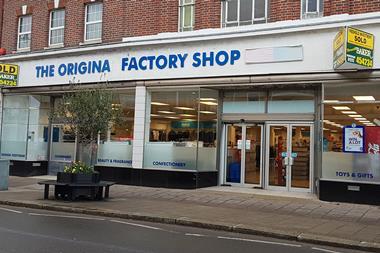There has been plenty of grumbling over the years about the money earned by consultants but if Ernst&Young can come up with the answers to all the unanswered questions posed by the BRC’s radical rates proposals in the next eight weeks, they deserve all they get.
That’s the timeframe the BRC has given for EY, as they prefer to be called nowadays, to flesh out a series of proposals for a new taxation system it hopes will be fairer to retailers.
Business Rates: The Road to Reform, published yesterday, certainly threw a curveball to the industry.
Having campaigned doggedly for the business rates system to be declared “unfit for purpose”, it was no surprise that the Consortium stressed that the rates system needs more than “tinkering around the edges”.
But few outside the discussions, headed by the likes of Sainsbury’s, would have guessed that option number one would be a completely new tax to replace rates based on energy use.
While the plan attracted plenty of positive headlines, some doubt it will ever see the light of day.
“There is a huge amount of flesh needed to be put on these bones”
In fairness the BRC’s report makes it quite clear this is just one of a string of proposals, which have many potential drawbacks, or “watch outs”, as it calls them.
Convincing the government to scrap a £25bn rates system – of which roughly £7bn comes from retailers – in favour of an unproven tax based on a Climate Change Levy which was vehemently opposed by the BRC when it first came into being might prove to be a case of blue-sky thinking gone too green.
BRC director general Helen Dickinson admitted the scheme had not yet been discussed with other less energy-efficient businesses, such as manufacturers, who will no doubt be seeing only one colour: red.
The BRC says it has meetings lined up with these and other groups to discuss this and its other proposals, and it would certainly be interesting to be a fly on the wall.
Those other options include doing away with the current property-based system to incentivise businesses based on how many people they employ, as well as a third suggestion of discounting rates bills for those paying the most in Corporation Tax. Both were described by one source as “taxes to favour supermarkets drawn up by supermarkets”. Dickinson and Sainsbury’s CFO John Rogers, who presented the plans, admitted they were all on the “fundamental side”, and the BRC is not normally what you would call a fundamentalist regime.
As Dickinson pointed out, there is a strong sense that something radical needs to be done to rates, not just cosmetic reform.
Yet having ditched like a hot potato the idea of some sort of a tax to “level the playing field” between traditional retailers and online players – not least because they are often one and the same company – the BRC appears to have been left scratching around for alternative solutions that may not entirely stand up to close scrutiny.
“There has to be something wrong with the system,” says the director general, when there are already so many exemptions and reliefs, let alone when the Chancellor has to step in and freeze a crippling rates rise (albeit temporarily) to stop shops closing.
But the BRC’s proposals would require as many, if not more, exemptions, and if they are not to cause outright uproar from other business groups, or just be dismissed as unworkable by the government, there is a huge amount of flesh needed to be put on these bones.



















No comments yet